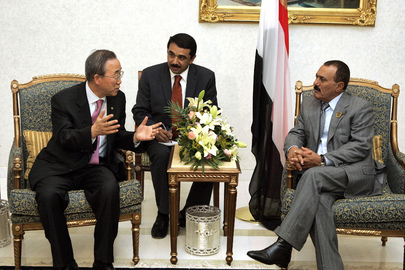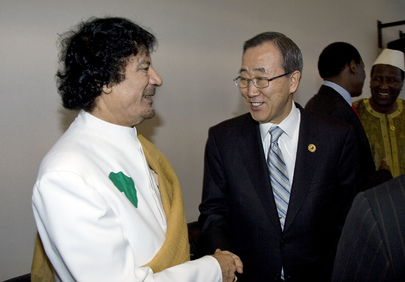As
UNDP
Postpones Syria Program, Proceeds on Bahrain & Yemen in June,
Continues in Sudan, Sri Lanka
By
Matthew
Russell Lee
UNITED
NATIONS,
April 30 -- The UN
Development Program on Saturday announced
that it is
removing its program for Syria from the agenda of its June Executive
Board meeting, due to “the crisis” there.
But
still on the
agenda
for the June meetings, so far unremarked on, are UNDP program
for also crisis-ridden Middle East countries like Bahrain and Yemen,
as well as Zimbabwe.
So what are UNDP's standards?
Bahrain
has seen,
with military support from Saudi Arabia, the pursuit of protesters
into hospitals and the use of
mercenaries from Pakistan and Yemen.
In
Yemen, despite
Gulf Cooperation Council intervention, protests are still being shot,
while longtime strongman Saleh is being offered immunity.

UN's Ban and Yemen's Saleh, with Bahrain still on UNDP June agenda
Why
postpone only
program in Syria, and not Bahrain or Yemen? As correctly
questioned,
the UNDP website does not have links to program documents for these
countries as it does for others.
Also
in the
Middle East, UNDP until the end funding training for police in Egypt
which advocates said involved presenations from human rights abusers,
not defenders. Until exposed by Inner City Press, UNDP in
Libya had Aisha
Gaddafi as a “Good Will Ambassador.”
Meanwhile,
UNDP
continues program in Sudan, which bombs civilians and clinics in
Darfur and uses militia in the South, and in Sri Lanka, where a UN
Panel of Experts report released last week describes the current
Rajapaksa government as killing tens of thousands of civilians. The
critique
triggering UNDP's Syria announcement also correctly mentions
previous UNDP programs with dictators in North Korea and Myanmar.
If
UNDP is to
reconsider programs, as it should, it should be done across the
board, and on some kind of objective basis. Instead, UNDP throws
belated bones on a politicized basis and hopes to weather the storm.
Watch this site.
* * *
Under Gadhafi, UNDP has
Praised Libya on MDGs & UN Women, Contra Ban
By
Matthew
Russell
Lee
UNITED
NATIONS,
February
22 -- As questions
mount
about the UN's coddling of
dictators in the Middle East and North Africa, Secretary General
Ban
Ki-moon and his spokesman have claimed that the UN, through the UN
Development Program and its Human Development Report, have been
criticizing the region's lack of democracy for years. Click here
for
UN's February 17 answer to Inner City Press.
But
the UN
system's coordinator for Libya, UNDP
official Costanza Farina, has in
fact been praising Gadhafi's regime. She has said, “''Libya has
made immense progress and is well positioned among the countries
that
will be able to say that they have reached 8 of the Millennium
Objectives in 2015.” And click
here, 2010 "UNIC Tripoli organizes Reception at UN House in
celebration of UN Day."
She
has also praised
Gadhafi on women's rights, as Libya is on the board of UN
Women:
“the
UN chief for Libya, Costanza Farina, said that the fight against
violence against women was one of the priorities of the agencies
operating in the country and announced that the United Nations
Development Programme (UNDP), thanks to a contribution from the Dutch
embassy in Tripoli, would be able to support the programme
financially. Farina added that Libya is one of the 41 members elected
to the executive committee of the new UN Women agency, which was
created on July 2 to show the desire of governments to respect women.
Farina also said that "Libya confirmed the equality in rights
between men and women in 1969.”
Maybe
she
is
unaware, as “local
UN
officials said, the new coordinator of the UN
in Libya, Costanza Farina, credited only last June 1, is located in
Geneva.”
As of February
22, UNDP Libya had a
blank press release page.
On February
17,
Inner City Press had asked
Nesirky
Inner
City
Press:
Is there any thought of using the existing UN programs on
the ground, whether it is UNDP or otherwise? There was some
criticism of this training of police in Egypt prior to the — there
was criticism by NGOs that it didn’t bring in human rights
activists but rather Government people. Is there some thinking of
how — the UNDP website about Libya hasn’t been updated now in
several months, I guess — it seems to some, due to the turmoil. What
about these UN…?
Spokesperson
Nesirky:
Who
might that be? Who is it, these people who think it
might be?
Inner
City
Press:
People that look at it and have seen that it was updated
all the way, until suddenly there was turmoil in the country and then
it is not updated any more. What’s the role, according to the
Secretary-General, of the existing UN programmes in countries like
Libya and Yemen, where Helen Clark visited and didn’t say anything
about democracy?

UN's Ban & Gadhafi, MDG and woman's right praise
not shown- erased?
Spokesperson
Nesirky:
Well,
there are lots of, as you know, across the region,
there is a UN presence in different constellations; country teams
with different components, whether it is UNDP or other UN agencies,
funds and programmes. Of course, given that they are already on the
ground, given that they have been working there in different
capacities on different projects, they are well placed to be further
involved. But this is part of a bigger picture, and it is being very
carefully coordinated.
Inner
City
Press:
Is there any change of policy? I guess I am saying,
given that the announcement today that the UN is sort of taking
cognizance of all this, is there, is that…?
Spokesperson
Nesirky:
Well,
Matthew, it’s hardly an announcement today. This
is something that has been said consistently for a number of weeks
now. And indeed, further back, as you know, the Human Development
Reports on the Arab world have been saying this for the best part of
a decade. So, okay, thank you very much.
What
have
the UN
and UNDP been saying about Gadhafi, other than praising MDG
achievements and women's rights in Libya? Watch this site.
* * *
As
Libya
Kills
Protesters,
Gadhafi Daughter is UN Ambassador, UNDP Silent
By
Matthew
Russell
Lee
UNITED
NATIONS,
February
20
-- As in Libya the forces, including
mercenaries, of Colonel Moammar Gadhafi shoot and kill peaceful
protesters, the UN has been nearly entirely silent.
On
the morning of February 20, Inner City Press asked UN Secretary
General Ban Ki-moon's spokesman Martin Nesirky:
In
the
wake
of
the gunning down of 46 democracy protesters in Libya’s
second largest city, Benghazi, by security forces under the command
of Colonel Gadafi, is the UN reassessing its relationship with Col
Gadhafi’s daughter, Aicha, who the UN has designated a “Goodwill
Ambassador?
Has
the
Secretary-General
sought
to use the UN’s special relationship
with its Goodwill Ambassador Dr Aicha Gadhafi to persuade her father
not to use such excessive force against peaceful demonstrators?
Nine
hours
later,
no
response at all from the UN. Inner City Press also asked Ban's
spokesman Nesirky “in this context, the Secretary-General's planned
trip to California to meet and greet 'the entertainment industry,'
how much is this trip costing, and is it funded by the Regular Budget
of the UN -- and if not, what is the funding source?” Again, no
answer.
On February
17,
Inner City Press had asked Nesirky
Inner
City
Press:
Is
there any thought of using the existing UN programs on
the ground, whether it is UNDP or
otherwise? There was some
criticism of this training of police in Egypt
prior to the — there
was criticism by NGOs that it didn’t bring in human rights
activists but rather Government people. Is there some thinking of
how — the UNDP website about Libya hasn’t been updated now in
several months, I guess — it seems to some, due to the turmoil. What
about these UN…?
Spokesperson
Nesirky:
Who
might
that be? Who is it, these people who think it
might be?
Inner
City
Press:
People
that look at it and have seen that it was updated
all the way, until suddenly there was turmoil in the country and then
it is not updated any more.

UN's Ban and Gadhafi, Goodwill Ambassador daughter not shown
Inner
City
Press:
What’s the role, according to the
Secretary-General, of the existing UN programmes in countries like
Libya and Yemen, where Helen Clark visited and didn’t say anything
about democracy?
Spokesperson
Nesirky:
Well,
there
are lots of, as you know, across the region,
there is a UN presence in different constellations; country teams
with different components, whether it is UNDP or other UN agencies,
funds and programmes. Of course, given that they are already on the
ground, given that they have been working there in different
capacities on different projects, they are well placed to be further
involved. But this is part of a bigger picture, and it is being very
carefully coordinated.
Inner
City
Press:
Is
there any change of policy? I guess I am saying,
given that the announcement today that the UN is sort of taking
cognizance of all this, is there, is that…?
Spokesperson
Nesirky:
Well,
Matthew,
it’s hardly an announcement today. This
is something that has been said consistently for a number of weeks
now. And indeed, further back, as you know, the Human Development
Reports on the Arab world have been saying this for the best part of
a decade. So, okay, thank you very much.
But
what had the UN
been doing about Libya? Watch this site.